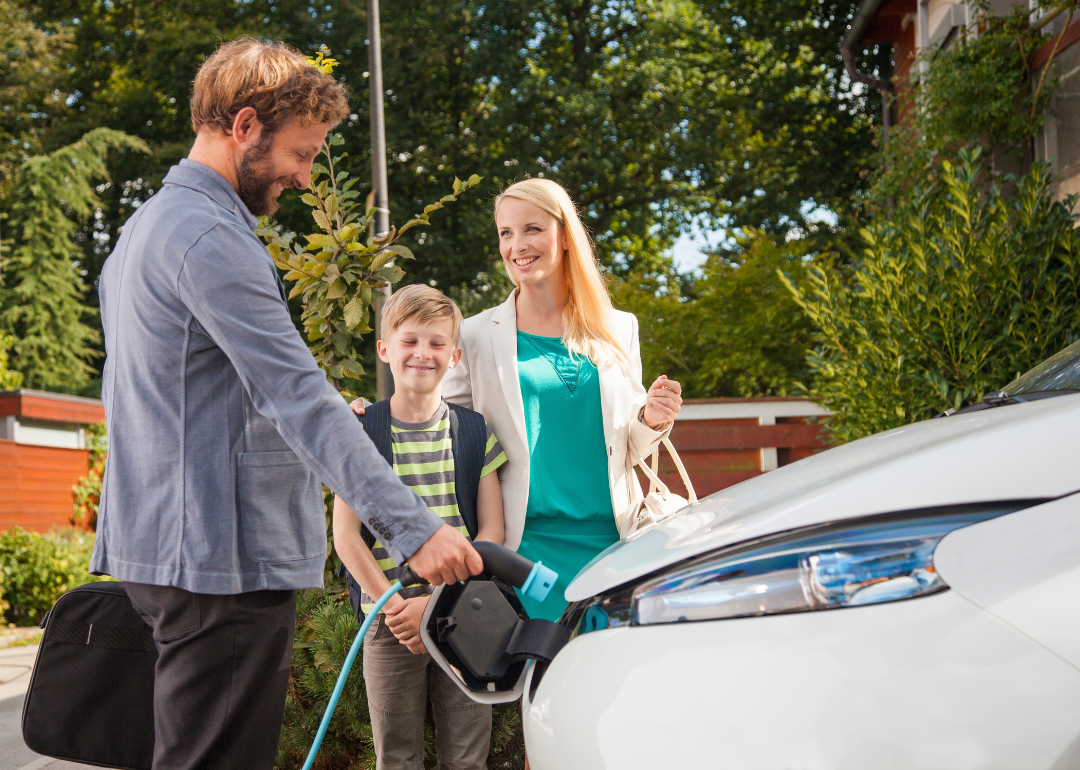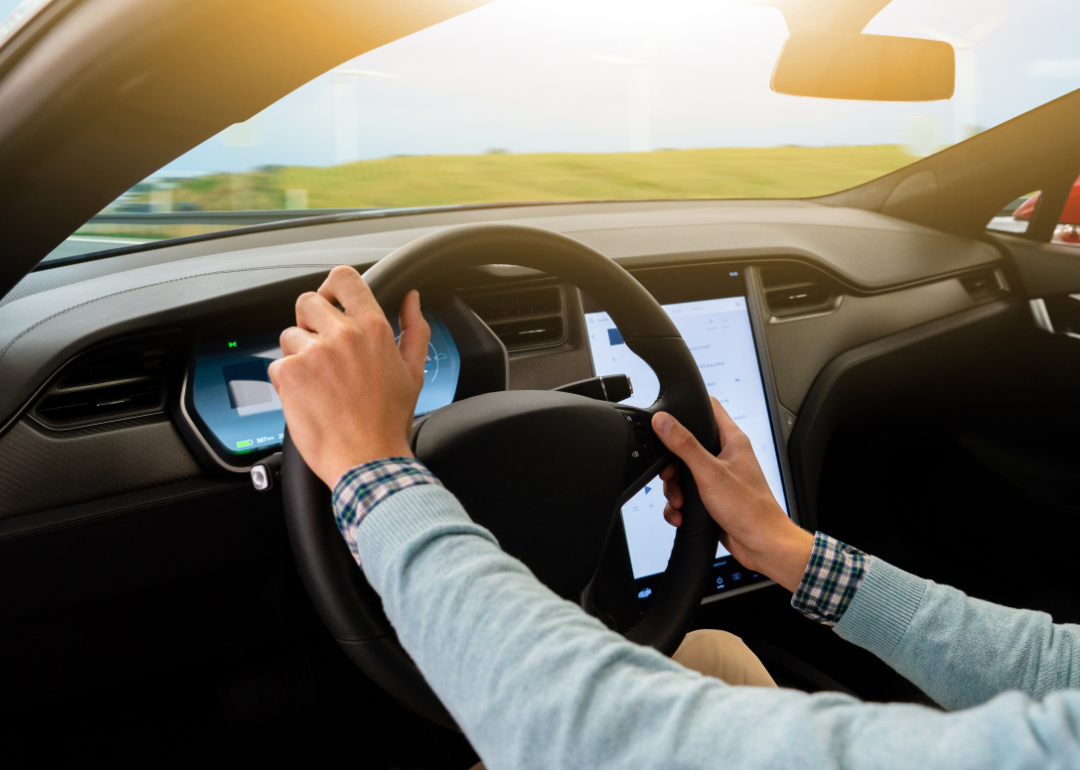
Do electric cars have the edge over gas-powered cars when it comes to saving you money?
Do electric cars have the edge over gas-powered cars when it comes to saving you money?
Electric cars have plenty of advantages over gas-powered cars, like never having to stop at a pump, improved efficiency, lower maintenance needs, and reduced emissions. Of course, gas cars have advantages like fast refueling and no heavy batteries. But when it comes to saving you money, which type of car has the edge? Edmunds takes a deep dive into the world of electric cars to determine whether EVs can save you money and where they might actually cost you more.
Let's start with EV cost of ownership.
Electric car maintenance
Gasoline-powered cars have a lot of intricate moving parts. In fact, a vehicle with an internal combustion engine (ICE) can have 100 times as many moving parts in its drivetrain as an electric car. All of those parts require maintenance and upkeep, including regular oil changes and larger maintenance needs at regular intervals to service belts, timing chains, spark plugs and more.
Of course, EVs still wear out tires, brake pads, windshield wipers and other common components, so they're not maintenance-free. The U.S. Department of Energy determined that, on average, an EV costs 4 cents less per mile to maintain if you factor in all scheduled services. That adds up to $4,000 in savings if you keep an EV for 100,000 miles.
And that number only takes into account regular service, not milestones like a 100,000-mile service that can cost several thousand dollars or other repairs and maintenance issues that can arise with gas cars. A recent report found that the average "check engine light" repair cost was $400 in 2022 and that the most common repair was a catalytic converter replacement at a cost of over $1,300. With fewer moving parts, EVs have fewer parts that can fail and incur large repair bills.
But even with all the added upkeep gasoline cars require, there's one big variable for EV maintenance that concerns a lot of potential buyers.
EV battery replacement cost
Electric car batteries gradually lose their ability to store charge over time, meaning less driving range as the vehicle ages. Eventually, batteries will need to be replaced due to loss of capacity or for other reasons. This cost will come later in the vehicle's life and is unlikely to affect the original owner.
The federal government requires that EV batteries be warrantied for a minimum of eight years or 100,000 miles, and some manufacturers offer more, up to 10 years and 150,000 miles. That warranty includes replacement if your battery capacity drops past a certain percent, usually 70%, of the original capacity. On average, electric cars lose about 2% of their capacity per year, so you probably won't need a replacement during the warranty period. New-car buyers keep their cars for an average of about eight to nine years, so they're unlikely to have to deal with battery replacement at all.
What about people who plan to buy or own an EV that's 13 to 15 years old? In 2022, the average price for an EV battery was $153 per kWh. That means even a relatively small battery, like the 40-kWh battery pack in a standard-range Nissan Leaf, could cost more than $6,000 to replace. That's a significant added cost.
The good news is that battery prices have fallen a lot, coming down almost 90% since 2008, according to the DOE. Many people expect prices to continue to fall, but even at half the current price, there's no question that a battery replacement is a pricey proposition.
Ultimately, even with this added cost factored in, an EV can be cheaper to maintain over its lifetime than an ICE vehicle. The contrast is the relative certainty of battery replacement costs by 200,000 miles versus the uncertainty around what major mechanical repairs an ICE vehicle may need in that same period. Owning a car with over 100,000 miles is always going to come with more maintenance costs, EV or ICE.
Electric car fuel costs
Fuel is one of the major potential cost savings for EV owners, but how much you'll save depends a lot on how and when you charge your car.
Charging at home is the surest way to save. In December of 2022, average residential electric rates hit almost 15 cents per kWh. The average observed efficiency of EVs that have undergone Edmunds' real-world range test is about 32 kWh/100 miles. That makes for a cost of $4.80 to travel 100 miles.
Over that same time period, gas averaged about $3.45 per gallon. That means that if you wanted to pay the same amount for 100 miles of travel in a gas-powered car, you'd need a car capable of returning almost 72 miles per gallon. The average EPA-estimated fuel economy of new cars is closer to 25 mpg, making for a cost of $13.80 per 100 miles.
So an EV would save $9 for every 100 miles driven, or put another way, it would save the average American almost $1,300 in fuel costs annually. Of course, utility rates and fuel prices fluctuate both over time and regionally. Read our deep dive into the cost of charging an EV to learn more.
If you use public DC fast chargers, the equation changes, especially with time-of-use rates. Using a Level 3 charger during peak hours can cost 45 cents per kWh or more, especially if you're not subscribed to a charging plan and charge as a guest. That triples the cost per 100 miles when compared to home charging, reaching $14.40 at 15 cents per kWh — more than our example gas vehicle. Subscribing to an EV charging network and charging off peak can potentially lower that cost to less than $7 per 100 miles of range, so it is still possible to use public fast chargers and save.
To figure out if fueling an electric car will save you money, you need to ask where you'll do most of your charging. If you can charge overnight at home, an electric car will almost certainly cost less to fuel than even the most efficient gas vehicle.

Other benefits of plugging in at home
Setting up a charging station at your home has other benefits beyond cost savings. If you can charge at home, having an electric car as a commuter vehicle can save you time. Because you can plug in at night, you leave every day with a "full tank" and never need to stop at a gas station. That's also a bit less stress since you don't have to worry about where a gas stop fits into your schedule or handle public pumps.
Some newer electric cars can also act as a battery backup for your home should you lose power. Considering EV battery packs are almost always larger than the daily energy use of the average household, an EV can keep vital appliances running for several days if needed. On their own, battery backups can be expensive, but they're much safer than generators that emit carbon monoxide. Getting a home battery backup and transportation in one is a convenience gas-powered cars can't offer.

EV tax incentives
The average price of an electric car is higher than the average price of a gas-powered passenger vehicle. Add to that other one-time costs like installing a home charging station, and even with the potential fuel and maintenance savings, it may seem like the overall cost won't be significantly less.
But there are a number of programs designed to help offset that upfront cost. The most well-known is the federal tax credit, under which qualified buyers can receive a $7,500 tax credit for purchasing a qualifying vehicle. There's also a federal credit of up to $4,000 for used EVs. Check out our full breakdown of the current tax credits to learn more.
Beyond that, several states offer their own incentives or rebates, some of which offer credits that are applied at the time of sale. There are also state, local and utility-funded programs to help offset the cost of installing a home charging station.
Depending on your situation, where you live, and what vehicle options you're considering, you may be able to use incentives and rebates to keep your cost of getting started with an EV from pushing up your net cost of ownership.

Improved efficiency and performance
Electric cars have advantages over gas-powered vehicles beyond their lower cost to operate. For starters, much more of the energy you pay for is actually used by an electric car compared to a gas car.
Electric car efficiency
Due to the way internal combustion engines operate, they end up wasting a lot of the energy stored in gasoline. Only about a quarter of the energy in gasoline actually winds up moving the vehicle. Most of the energy is lost in the form of waste heat, and the rest is lost to friction and parasitic drag from the drivetrain.
Electric cars are significantly better at using the energy stored in batteries, especially since they don't generate waste heat or experience as much parasitic loss. Also, electric cars can recapture energy while slowing down and return it to the battery to use again, giving them a big efficiency boost. (Being able to recapture energy is also part of how hybrids gain efficiency over regular gas cars.)
In the end, electric cars have an efficiency of about 90%, massively better than even the most efficient internal combustion powertrains.
Acceleration and driving experience
Electric motors have two advantages over internal combustion engines that improve the day-to-day driving experience of electric vehicles. Electric motors can make consistent power from a standstill all the way up to a significantly higher rpm than gas engines. Gas engines need to get up to a certain speed before they can produce max power, and their complicated construction limits how fast they can spin. That means electric cars have instantaneous torque and don't need to change gears.
Whether you're at a stop or traveling at speed, electric motors can instantly increase the amount of power they're sending to the wheels. This makes electric cars feel quicker in typical driving than gas cars, and it's partly why so many electric cars do accelerate more quickly than their gas competitors.
Electric cars also don't need to change gears the way gas-powered cars do to keep their engines in the meat of the powerband. That means whether you're accelerating up an on-ramp, climbing a hill, or passing slower-moving traffic, you won't experience any jerky shifting and the car will apply power smoothly and consistently as you accelerate.

Improved environmental impact
Electric cars are an important way to reduce both local pollution that's harmful to your health and carbon emissions responsible for global warming.
Since electric cars don't rely on combustion to move, they don't generate exhaust gases or particulate pollution from burning fuel while driving. That makes them much better for local air quality, reducing types of pollution that have been linked to things like cancer, cardiac disease, neurological impairment, and developmental delays in children.
Electric cars also produce fewer greenhouse gas emissions over their lifetimes than gas-powered vehicles. Building an electric car is resource-intensive, especially due to their large battery packs, which can result in up to 80% more carbon emissions than building an internal combustion engine vehicle. However, once an electric car is on the road, it's responsible for significantly fewer carbon emissions than a gas vehicle.
The U.S. Department of Energy says that on average a gas-powered vehicle produces three times the annual carbon emissions of an EV, and that average includes EVs charged with electricity from nonrenewable sources like coal and natural gas. Because EVs are so efficient in how they use energy, even electric cars charged from dirty energy are responsible for fewer net emissions than gas-burning cars.
Taking into account manufacturing emissions, it takes an average of just 15,000 miles on the road for an EV to start reducing greenhouse gas emissions compared to a gasoline vehicle.
Switching to EVs can also help accelerate our independence from fossil fuels, as electric cars don't require fossil fuels to stay on the road. And it's not just independence from oil. As the cost of energy from renewable sources like wind and solar power continues to fall in comparison to coal and natural gas, switching to green energy becomes a more economical solution to increasing demand for electricity to power EVs. And as the grid continues to shift more toward renewable energy, the environmental impact of electric cars will improve.
In Summary
Electric cars can cost less to own, especially if you can charge at home, qualify for tax and other incentives, and don't plan on keeping your EV for more than a decade and a half. If you plan on using public fast chargers or driving an older EV that may need an out-of-warranty battery replacement, an electric car might not be a more economical option.
This story was produced by Edmunds and reviewed and distributed by Stacker Media.



